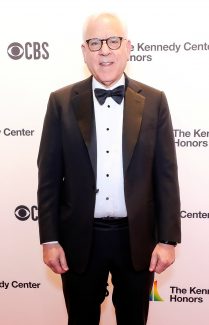David Rubenstein’s view of giving—and giving.

David Rubenstein is best known for what he has labeled “patriotic philanthropy,” which involves acquiring and giving to the nation historic documents including a contemporary copy of the Magna Carta for $21 million, (there are 17 in existence, and only one in private hands), the Declaration of Independence, and underwriting the restoration and repair of the stones of history—the Washington Monument, Monticello (two separate gifts, each of $10 million), the Custis-Lee Mansion at Arlington National Cemetery and Mount Vernon, among other sites. But his first charitable giving was the David Rubenstein Child Health Building at Johns Hopkins, and his website lists 50 philanthropic projects, which includes projects at Duke University, Rubenstein’s alma mater, the giant pandas at the Smithsonian National Zoological Park, the National Museum of African-American History and Culture and restoration of the Smithsonian American Art Museum’s Renwick Gallery.
It’s an illusion that Rubenstein, founder of the Carlyle Group, one of the world’s leading equity firms, is a member of every board in the metropolitan area; but he is on the board of regents of the Smithsonian Institution, chairman of the Kennedy Center and the Council on Foreign Relations, chairman emeritus of the Brookings Institution, plus a few other positions.
For someone so visible, he is extremely private, hard-working, and for a billionaire, modest. But in his campaign to interest others in philanthropy—and patriotic philanthropy in particular—he has developed a YouTube persona, and makes speeches and gives interviews laced with stand-up comic humor (“When I went to work for the Jimmy Carter campaign he was 33 points ahead of [Gerald] Ford, and he won by one point, which shows you how effective I was.” A sample of Rubenstein’s imparted wisdom:
‘In philanthropy, it’s much harder to give it away than to make it.’
On Why He Became a Philanthropist: “I realized I could take all my wealth and keep accumulating it and when I die I’d be the richest person in the cemetery, but I thought I probably didn’t need my money in the afterlife, so I signed the Giving Pledge, and I decided to give away my money, but try to do it in intelligent ways. In philanthropy, it’s much harder to give it away than to make it.”
On Patriotic Philanthropy: “Patriotic philanthropy is giving back to your country, because that country doesn’t have the resources it once had. So when you can give to organizations like the National Archives, the Smithsonian, the Kennedy Center, the National Park System, it’s a good thing to do.”
On Why He Acquired The Magna Carta: “The Magna Carta was the inspiration for the Declaration of Independence, for the Bill of Rights, and the things that enabled me to move from modest circumstances are the freedoms embedded in these documents.”
On Why He Went On to Buy Other Documents: “So, I started buying other historic documents and putting them on display, but what’s the relevance of it? If I told you I had a copy of the Magna Carta, a facsimile on paper, you would say, ‘OK, I can look it up in a textbook any time.’ People still want to see the original of something. By having these historic documents where people can see them, they might learn a little bit more about American history. We don’t know as much about history as we should.”
Restoring The Washington Monument, Damaged in the 2011 Earthquake: “I said I’ll put up all the money to repair it. The Congress said no, we want some credit for doing something, so I put up half of it, and they put up half of it.”
His View of Philanthropy: “Philanthropy is not rich people writing checks. The ancient Greek word means loving humanity—helping other people. You can help other people with your ideas, your love, your energy. You will live longer when you give back to your country, because you’ll feel better about yourself. It’s a natural human instinct to want to help people: that’s what separates us from other mammals. All of you who want to go to heaven will probably go to heaven more quickly. I can’t prove that, but why would any of you want to take a chance?”
‘You will live longer when you give back to your country, because you’ll feel better about yourself. … All of you who want to go to heaven will probably go to heaven more quickly. I can’t prove that, but why would any of you want to take a chance?’




